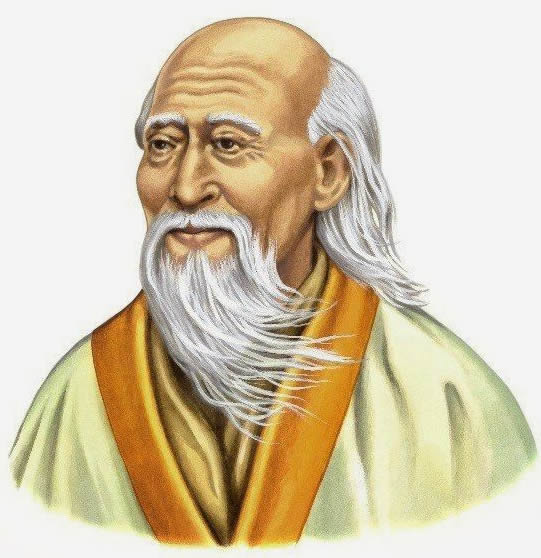 |
| Laozi |
Confucianism and Daoism are the two most influential philosophies in China. Both had their roots during the later Zhou dynasty in the era of the Hundred Schools of Philosophy.
The political and social environment that inspired the Hundred Schools was the breakdown of the Zhou monarchy and the rise of powerful states that warred with one another for the right to rule China, and the economic progress and social changes that had disrupted the traditional social order.
All philosophers agreed that China had lost its way, or dao. Whereas the Confucians were traditionalists who interpreted ancient texts to fit their view of political philosophy and morality, the Daoists were rebels against the bonds of a decadent society; they preached renunciation of the world and a return to primitive simplicity, which was to them the golden age.
  |
Whereas a fixed date and fairly accurate biography have been established for Confucius, nothing is certain about later Daoist claims concerning their founder Laozi. He purportedly lived in the sixth century b.c.e., hailed from the southern state called Zhu (Ch’u), and worked as an archivist in the Zhou court.
He later decided to leave China and was detained at the western border; the guards would not let him go until he had written down his philosophy. The resulting 5,000-word-long work is called the Laozi (Lao Tzu) or Daodejing (Tao-te Ching), which means the "Canon of the Way and virtue
After that he traveled west, reached India, and converted Gautama Buddha, founder of Buddhism, to his philosophy. However, Laozi means "old master" in Chinese, indicating that the founder of Daoism did not even have a surname, though his followers in later centuries gave him one, Li.
 |
| Zhuangzi |
Whether he existed or not, there were hermits and recluses in China during the era of the Hundred Schools, and Daoists were obviously among them. This school is also called "Teaching of the Yellow Emperor and Laozi" (the Yellow Emperor is the mythical founder of the Chinese nation) or the "Teachings of Laozi and Zhuangzi". Zhuangzi means master Zhuang. His given name was Zhou, and he lived between around 369–286 b.c.e.
He was a historical figure who was a minor official for a while but lived as a recluse most of the time. Zhuangzi was the second most important figure of Daoism and was contemporary of Mencius, the Second Sage of Confucianism. He and his followers left a prose work named the Zhuangzi (Chuang Tzu).
The Laozi, or Daodejing, contains a philosophy of life and government. It has been read and puzzled over by its Chinese readers and in translations by readers the world over because it can be approached at different levels and yield different interpretations. It is part prose and part poetry and both enigmatic and profound. It opens thus:
The Dao [Way] that can be told of Is not the eternal Dao;
The name that can be named
Is not the eternal name,
Nameless, it is the origin of Heaven and Earth
Namable, it is the mother of all things.
Refrain from exalting the worthy,
So that the people will not scheme and contend;
Refrain from prizing rare possessions,
So that the people will not steal;
Refrain from displaying objects of desire,
So that the people’s hearts will not be disturbed
Therefore a sage rules his people thus:
He empties their minds,
And fills their bellies;
He weakens their ambitions
And strengthens their bones.
In other words, the ideal ruler and government do not interfere in the lives of the people and lead them to the golden age of primitive simplicity by nonaction. It is civilization that has corrupted humanity from its early state of innocence. The sage practices nonaction, gives up worldly ambitions, and lives a simple life in accord with nature.
The Laozi also criticized the do-gooders (such as Confucians) thus: "He [the ruler] strives always to keep the people innocent of knowledge and desires, and to keep the knowing ones from meddling. By doing nothing that interferes with anything, nothing is left unregulated".
The Zhuangzi is a book that is full of humor and whimsy, which pleads for a kind of spiritual freedom for humans so that he or she can rise above individualism and partial understanding. Only then can a person achieve full happiness that is beyond change and freedom from both life and death.
One passage from his book illustrates his point. When Zhuangzi’s wife died, his friend Huizi (Hui Tzu) came to offer condolences. Finding him singing Huizi was offended and reprimanded him for disrespectful behavior.
Zhuangzi replied: "You misjudge me. When she died I was in despair, as any man might be. But soon pondering on what had happened, I told myself that in death no strange new fate befalls us ... For not nature only but man’s being has its seasons, its sequence of spring and autumn, summer and winter. If some one is tired and has gone to lie down, we do not pursue him with shouting and bawling. She whom I have lost has lain down to sleep for a while ... in the Great Inner Room. To break in upon her rest with the noise of lamentation would but show that I knew nothing of nature’s Sovereign Law. That is why I ceased to mourn".